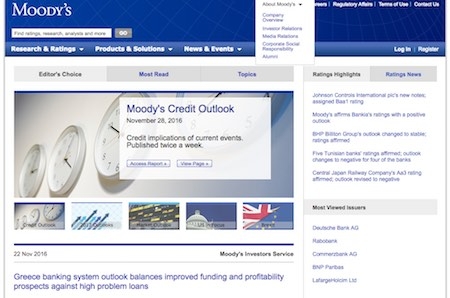Ratings agency Moody’s has warned that the FCA’s review of the value of active fund management could hit fund managers profits if major reform takes place.
Last week the FCA published a study criticising the value of active fund management saying that the additional fees often associated with active fund management did not result in better performance compared, for example, to passive funds.
The FCA said competition between fund managers was often “weak.” The study met with a mixed response from the fund management sector.
Moody’s says the FCA’s proposals following its asset management market study could entail risk for the sector. Compliance and operational costs “will certainly go up”, it warns, while fees come down, pressuring active asset managers’ profit margins and potentially spurring consolidation.
The company says that active fund managers are not currently structured to operate at “significantly lower fee rates” and the FCA’s proposed fee structure will require significant expense reduction. Cost management and economies of scale will likely become a priority and translate into market consolidation.
As the competition with passive investment intensifies, asset managers will also focus on adding value for investors and will have to adapt their business models to a more competitive environment.
Moody’s believes that those moving first will be most resilient to these negative forces. Bigger players with diverse solutions in both active and passive management, such as BlackRock or with diversified fund offerings and captive insurance client bases such as LGIM, are better positioned than smaller or less diversified peers to respond to the building regulatory and market pressures, according to Moody’s.
The FCA’s findings show that actively managed fund charges have stayed broadly flat for the past 10 years, suggesting “weak price competition” among asset managers, while charges for passive funds have fallen.
The FCA noted that as active funds grow, prices do not fall, suggesting that only asset managers capture economies of scale. The relationship between price and performance also appears low. According to the FCA, 42% of active funds have a low tracking error, indicating that they mimic the performance of their benchmarks, and after costs, very few active funds outperform their benchmarks, limiting their value to investors. These findings will likely exacerbate the loss of confidence the active-management sector is already confronting, says Moody’s.
To address the lack of transparency of cost and performance information, which renders comparison between products difficult, the FCA proposed the introduction of a single fee for investors, inclusive of all costs.
The FCA will gather market feedback on the proposals until 20 February and publish its final report and remedies in 2017.

